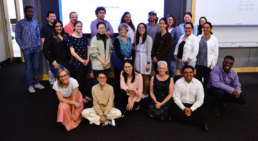News
Election 2024: Political Science First Takes
by Michael A. Smith, Professor of Political Science, Emporia State University Election 2024 is now in the books. While the last few ballots are still being counted, most of the winners and losers are now known. As usual, the breathless accounts of pundits and social media influencers often…
Connecting the past and present: Political scientist brings expertise to Wikipedia during election year
by Colleen McCoy, Communications and Outreach Coordinator at Wiki Education This blog has been reprinted with permission from Wiki Education. In the ever-evolving landscape of information, the need for accurate, well-sourced content has never been more critical, particularly in the midst of this…
Gearing Up for the Election, the Political Science Way
by Michael A. Smith, Professor of Political Science, Emporia State University It’s election time! This means plenty of excitement and trepidation. Some of it is valid, according to Political Science. Much of it is not. How can we use the tools of our discipline to separate the analysis from the…
Building Skills for the Future
by Muhammad Hassan Bin Afzal, Visiting Assistant Professor, Department of Political Science and Public Service, University of Tennessee at Chattanooga Muhammad Hassan Bin Afzal recommends taking advantage of training sessions, workshops, and short courses during your career's early stages or…
Serendipity in Academia: How the MPSA Conference Unlocked Doors I Didn't Know Existed
by Meherun Nesa, PhD student in Political Science, Loyola University Chicago As a doctoral student in Political Science at Loyola University Chicago, my research focuses on the complex linkages between international organizations and security challenges, with a concentration on peacekeeping…
Update: Restrictive New Voting Laws in the States
by Michael A. Smith, Professor of Political Science, Emporia State University In 2022, my colleagues and I published our book Much Sound a Fury or the New Jim Crow? The Twenty First Century’s Restrictive New Voting Laws in the States, with SUNY Press. The project began when we met and formed a…
Fascinating Findings: Health & Politics at MPSA 2024
By James Steur, Ph.D. Candidate, University of Illinois at Urbana-Champaign
 Political science is a discipline that…
Political science is a discipline that…
The Challenge of Teaching in an AI World
by Michael A. Smith, Professor of Political Science, Emporia State University The first day of #MPSA2024 is in the books, and it’s gotten off to a strong start. All panels I attended today were well-attended and thought provoking. I wrapped up my workday by attending an excellent panel on…
From Nerves to Knockout: Essential Tips for Conference Presentations
By James Steur, Ph.D. Candidate, University of Illinois at Urbana-Champaign
 MPSA is almost here, and many conference…
MPSA is almost here, and many conference…
#MPSA2024– This Is My Why
by Michael A. Smith, Professor of Political Science, Emporia State University Our world and our lives today are filled with all sorts of communications technology, making it possible for anyone with an Internet connection to meet up with people from all over the world without physically traveling…





